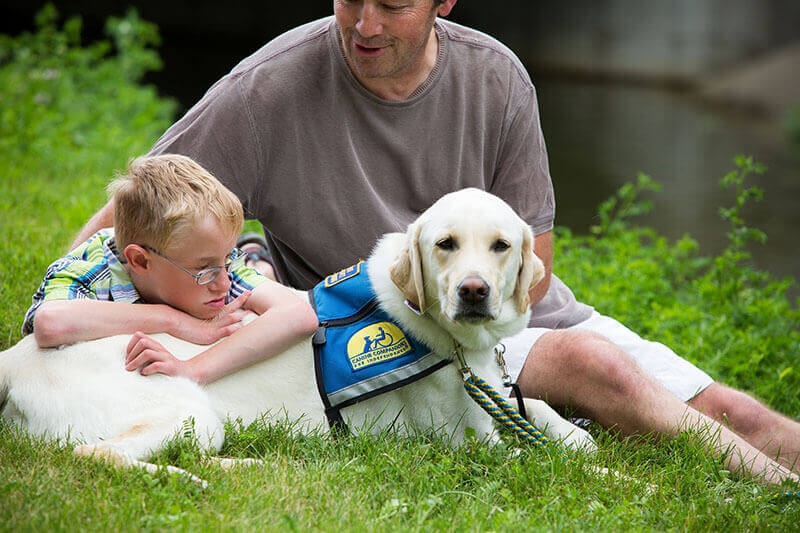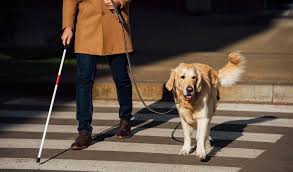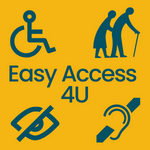
The Equality and Human Rights Commission
The Equality and Human Rights Commission (’the Commission’) have produced this guide to help tourism businesses welcome people with access requirements.
The Commission has a statutory remit to promote and monitor human rights; and to protect, enforce and promote equality. We are committed to the vision of a modern Britain where everyone is treated with dignity and respect and we all have an equal chance to succeed.
Who should read this guide?
If you offer a service to members of the public whether for payment or not, whether you are a one-bedroom B&B or a large visitor attraction, this guide is for you. It explains what your legal duties are to assistance dog owners under the Equality Act 2010 and how you can meet them, often at no additional cost.
1. What is an assistance dog?
Thousands of disabled people rely on an assistance dog to help them with day-to-day activities that many people take for granted. You may be surprised to learn that it’s not only blind people who are helped by assistance dogs.
Assistance dogs are also trained to help people with hearing loss, epilepsy, diabetes, physical mobility problems, and more. Assistance dogs carry out a variety of practical tasks for people as well as supporting their independence and confidence.
Assistance dogs are not pets and are treated as ‘auxiliary aids’
Assistance dogs are highly trained which means they:
· will not wander freely around the premises
· will sit or lie quietly on the floor next to their owner
· are unlikely to foul in a public place.
Most are instantly recognisable by the harness or identifying coat they wear. However, the law does not require the dog to wear a harness or jacket to identify it as an assistance dog.
Some, but not all assistance dog users, will carry an ID book giving information about the assistance dog and training organisation together with other useful information. Again, this is not a legal requirement and assistance dog users should not be refused a service simply because they do not possess an ID book.
Assistance dogs can also be owner-trained and the owner selects their own dog to fit their own requirements.

2. Why should assistance dogs be welcomed by tourism businesses?
Disabled people who use assistance dogs quite often experience discrimination that prevents them from doing everyday things other people take for granted. This is because B&Bs, tourist attractions, restaurants, and other businesses sometimes object to assistance dogs being brought onto their premises. If this happens, the effect is to deny the disabled person the opportunity to buy goods or use services in the way other people do.
Potential consequences include losing valuable business and risking claims of disability discrimination, which could result in financial compensation.
3. What are my legal obligations?
A disability is defined by the Equality Act 2010 as a physical or mental impairment which has a substantial and long-term adverse effect on the ability to carry out normal day-to-day activities.
It is unlawful for a service provider to discriminate against a disabled person in the following ways:
Direct disability discrimination – treating a person less favourably than others because they are disabled or perceived to be disabled. For example, refusing to allow entry to disabled customers, whether or not they have assistance dogs.
Direct disability discrimination by association – treating a person who may or may not be disabled less favourably because of their association with a disabled person.
Indirect disability discrimination – where a particular policy has a worse impact on disabled people than on people who are not disabled. For example, a ‘no dogs’ policy will have a worse impact on disabled people using assistance dogs and could be indirect discrimination unless the policy can be objectively justified.
Discrimination arising from disability – treating someone unfavourably because of something connected to their disability. For example, refusing the same level of service to a disabled person because they have an assistance dog.
Failure to make reasonable adjustments – where a physical feature, provision or practice puts a disabled person at a substantial disadvantage the service provider has a duty to take reasonable steps to avoid that disadvantage. For example, it will almost always be reasonable to disapply a ‘no dogs’ policy for assistance dog owners and a failure to do so would amount to unlawful discrimination.
Disability harassment – treating someone in a way which makes them feel humiliated, offended or degraded for reasons related to their disability.
Victimisation – treating a person who may or may not be disabled badly because they have made a complaint of discrimination or supported someone who has made a complaint.
Discriminatory advertisements – if a service provider advertises that in providing a service they will treat disabled people unfavourably this will amount to discrimination. For example, stating in a brochure that assistance dogs are not welcome on the premises.
Positive discrimination – the law recognises the particular disadvantages that disabled people face and so treating disabled people more favourably than others is permitted.
It would be unlawful to refuse a service to a disabled person accompanied by an assistance dog except in the most exceptional circumstances. Ultimately only a court can determine whether a refusal of service is unlawful and such a determination would be highly dependent on the specific facts and circumstances of the particular case.
4. Frequently asked questions
How can I tell if a dog is an assistance dog and not just a pet?
Assistance dogs are highly trained which means they:
· will not wander freely around the premises
· will sit or lie quietly on the floor next to its owner
If you have a lot of customer-facing staff, consider displaying a small sign or sticker on the door or wall at the entrances showing that assistance dogs are welcome. Make sure all relevant staff are made aware that they must allow access to assistance dogs
Can I charge extra for an assistance dog, to cover extra cleaning costs?
No, it is unlawful for service providers to pass on the cost of making reasonable adjustments to the disabled customer.
Can I charge a guest if their assistance dog causes damage to the property, for example, if the dog breaks something or scratches the woodwork?
It is highly unlikely that an assistance dog would cause damage to the property. It is unlikely to be reasonable to charge a disabled guest for any minor damage or wear and tear caused by an assistance dog.

If an assistance dog fouls on my premises, can I charge the owner for cleaning costs?
Assistance dogs are highly trained which means they are unlikely to foul in a public place. It is unlikely to be reasonable to pass on the costs of any additional cleaning to the disabled customer or anyone accompanying them.
What if the assistance dog is a danger or nuisance to other customers or staff?
Assistance dogs are highly trained to make sure they are always under control and will not be a nuisance to anyone. For example, they will not jump up and will lie down at their owner’s feet if the owner sits down to
eat. Disabled people who are partnered with assistance dogs may also receive expert training to ensure that they can handle their dogs.

Is it appropriate to have assistance dogs in the dining room/restaurant?
Assistance dogs are highly trained, have regular veterinary treatments and are tested on a regular basis to make sure they don’t present a health risk. The Chartered Institute of Environmental Health has determined that they are unlikely to present a risk to hygiene and should be allowed access to restaurants, cafes, hotels, food shops and other food premises.
I cook, prepare and serve my guests breakfast in our farmhouse kitchen, should assistance dogs be allowed?
European Regulation (EC) No 852/2004 on the hygiene of foodstuffs states that a food business operator must ensure adequate procedures are in place to prevent domestic animals from having access to places where food is prepared, handled or stored. However, in special cases access may be provided, for example to assistance dogs. Procedures should be in place to prevent such access from resulting in contamination.
Am I allowed to refuse a booking from someone with an assistance dog, if I already have a booking for that date from an individual with a dog allergy?
Refusing to allow access to people with assistance dogs because other people ‘might’ be allergic to dogs is likely to be unlawful disability discrimination. This is because the Equality Act 2010 states that service providers must make reasonable adjustments to policies for disabled people. This includes amending ‘no dogs’ and ‘no pets’ policies to allow access for assistance dogs when it is reasonable to do so.
If there is an identifiable person with an allergy to dogs then employers and service providers should take reasonable steps to ensure that person has minimal or no contact with dogs; reasonable steps are unlikely to include banning all assistance dogs.
We run a pet-free property, and I have an existing booking from a guest who is highly allergic to dogs. Who bears the cost if they cancel their booking because the assistance dog will be there?
Assistance dogs are not pets and service providers would be expected to make an exception to a ‘no pets’ policy for them. It is unlawful for service providers to pass on the cost of a reasonable adjustment to the disabled person. If another guest cancelled their booking because an assistance dog would be on the premises, you could not lawfully pass any resulting cost onto the disabled person, or anyone else accompanying them.
My husband and I run a two-bedroom B&B and I have an allergy to dogs meaning we don’t accept any dogs. Is this OK?
There is no exception in the Equality Act 2010 to cover this situation. In these circumstances, a service provider should carefully assess all possible means of accommodating a disabled person. This would include adjusting your duties to minimise or avoid contact with the assistance dog. Any additional costs of the adjustment, such as hiring extra staff or additional cleaning, should not be passed on to the disabled person.
I have a pet dog/cat on the premises and do not, therefore, think our B&B is suitable for guests to bring their own dog, even an assistance one. Is this OK?
Refusing service to an assistance dog owner in these circumstances is likely to constitute unlawful disability discrimination. It is unlikely to be reasonable or justifiable to refuse access to a disabled person because of inconvenience caused to the service providers or to their pets.
How do I tell people I am open for assistance dogs?
It is good practice to make it known that assistance dogs are welcome in your access statement but it is not a legal requirement to do so. A short statement such as ‘we have a no pets policy except for assistance dogs’ or ‘assistance dogs welcome’ would be sufficient. Make sure all relevant staff are made aware that they must allow access to assistance dogs. Most customers will assume that this is the case. Consider displaying a small sign or sticker on the door or wall at entrances showing that assistance dogs are accepted.

Comments